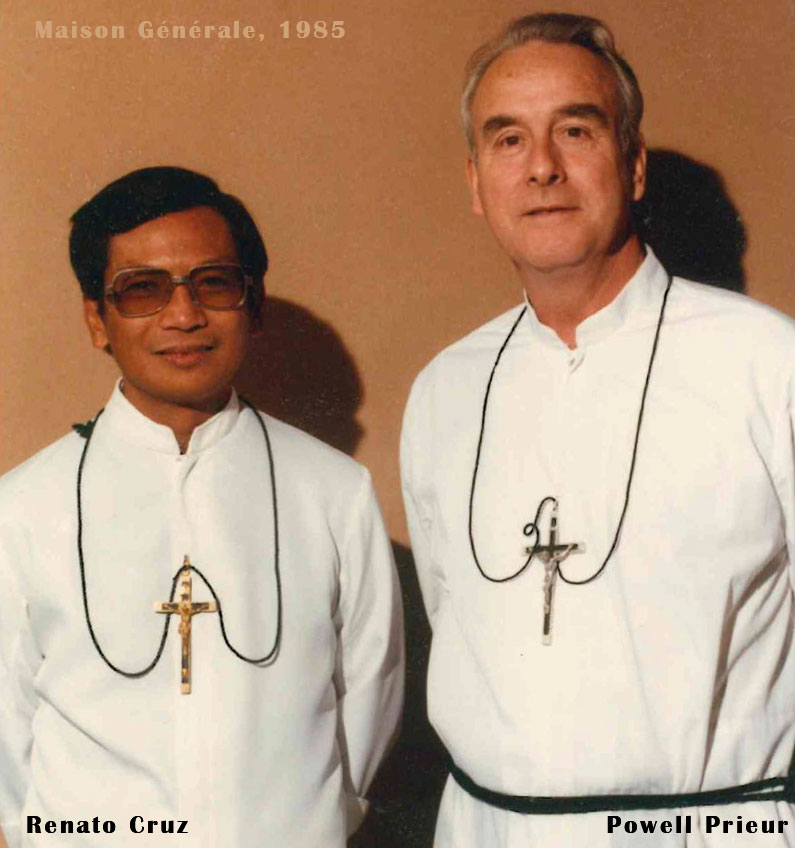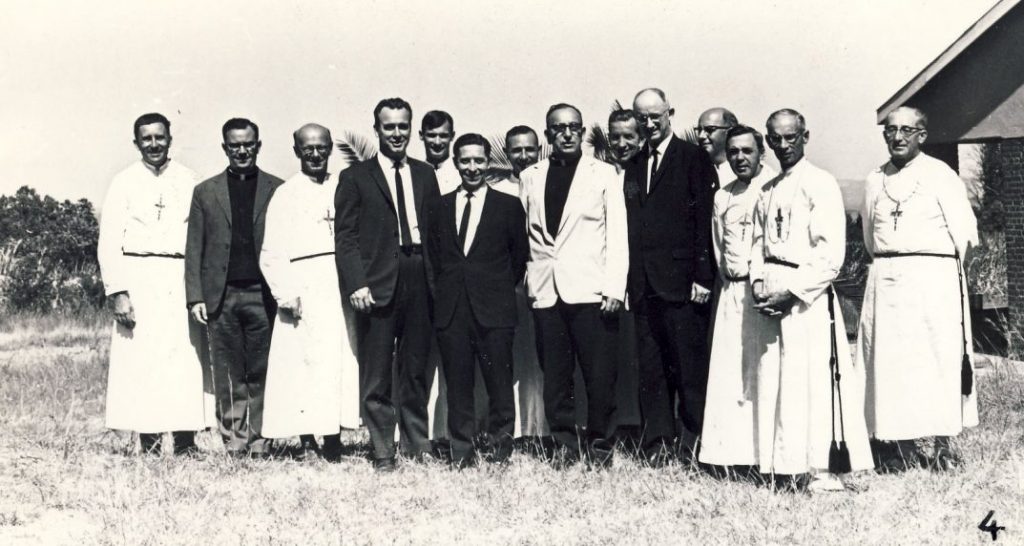
Brother Powell Prieur (Charles Bernard) – 1929 -2020
Brother Powell died on 30 March 2020, at Mont Champagnat, Château-Richer, Canada. He spent a large part of his Marist life as a missionary in Africa and gave his contribution to the animation of the Institute also from Rome. Here below, Brother Jacques Langlois speaks of his life, a beacon of hope for the whole Marist family.
“A MAN GIVEN TO HIS MISSION”: this could be the title of a long biography that would follow in the footsteps of this untiring Marist so devoted to the service of education and the institute.
He was born in Saint Vincent de Paul, near Montreal, on April 13, 1929, into a family of seven boys and three girls. English was the language spoken at home. He did not learn French until he entered primary school.
He made his first vows on August 15, 1947. After a year at the scholasticate in Iberville, he was invited to continue his studies at Marist College, Poughkeepsie, New York, where he received his B.A. with a major in science in 1952. A year of teaching followed in La Tuque. He made perpetual profession in July 1953, and a few weeks later he left Canada for Africa.
Zimbabwe (Rhodesia): a successful career
From 1953 to 1967 he was a teacher in various schools in Zimbabwe and Zambia. He made his mark at Kwekwe, a multiracial school, where he taught for twelve years, the last two while being headmasterl. His former students remember him with nostalgia both in the classroom and on the sports fields.
In November 1967 he was appointed Superior of the District of Rhodesia (Zimbabwe). Quite a challenge because the adaptation after Vatican II had begun. Besides, the country had declared itself independent from Britain two years earlier, which led to the closure of the borders with Zambia. With his leadership qualities, he was the man of the hour. He negotiated the transfer of Kabwe, Zambia, to the Castile Province. In exchange, the District took over responsibility for the foundation of Dete Secondary School. Powell obtained significant grants from Misereor for this project, which would offer academic and practical subjects.
During his third term in office Powell and his council decided to close the multi-racial school of Kwekwe for one year. The number of students of various races had dropped from 150 to 75 because of unrest in the country. The plan was to add more buildings in ’76 in order to be able to accept about 300 African pupils in ’77. This caused quite a controversy. A Brother criticized him in the newspapers, insisting that we should continue to witness against the white government’s racial policies. Powell, already tired in his ninth year at the helm of the District, was greatly affected. Brother Basilio Rueda then asked him to go to Rome to recover.

Rome: a new horizon
God’s ways are unfathomable. Powell thus found himself in Rome, where he had the opportunity to take courses in 1977. From 1978 to 1982 he worked with Bro. Charles Howard to lay the foundations for the Social Secretariat. This was in response to the Church’s call for a preferential option for the poorest. This office was looking for ways to financially support solidarity projects in developing countries. Over the years the Secretariat became the International Solidarity Office, and eventually the FMSI (Fundazione Marista per la Solidarietà lnternazionale.)
His talents were surely noticed. He was appointed General Councilor in October 1982 in order to fill a void. In the 1985 Chapter he was elected to the General Council while Bro. Charles Howard became Superior General. Brother Richard Dunleavy, also elected, said of this period: “We formed strong bonds of brotherly love and respect. Powell was a man with men, and always a brother with his brothers. He was a born leader, always seeing clearly the decisions to be made, but at the same time, always willing to listen to others for how to achieve the goal in sight.” Speaking of their experiences together in Rome and in his travels with him to Africa and elsewhere as councilors, he notes: “I learned to appreciate and admire his strong Marist spirituality, his simple lifestyle, and his commitment to what Pope Francis calls today, those who live on the periphery.”
It was during his term as General Councilor, that he and Bro. Charles Howard became involved in a project of great importance to Marist Africa. Looking at the statistics of this continent, he found that, although there were a number of first professions each year, the total number of Brothers remained roughly the same. He concluded that post-novitiate studies in secular institutions were the cause of multiple departures. The solution envisaged: to create a common marist study centre for the whole continent, both French and English. With good training teams we could help the young Brothers to strengthen their religious spirit. He gave his heart and soul to this project, which was born in Nairobi in late 1986, with Bro. Luis Sobrado as first superior.
A parenthesis on Powell’s health. During a stay in Zimbabwe in ’85 or ’86, he visited possible sites in Harare for this international centre. One evening, after visiting a suitable place, he returned to Kutama. After retiring to his room he felt very unwell and asked for the help of F. Emmanuel Lapointe. The local hospital was consulted and recommended that he be rushed to the Trauma Centre in Harare. It’s when they got there that he suffered a massive heart attack. The entire medical team worked hard on him and managed to save his life. He was hospitalized and recovered, but some of the muscles in his heart were no longer working. He had to live with this handicap for the rest of his life, which unfortunately slowed him down.
After completing his task in Rome in 1993,he moved to the MIC (Marist lnternational Centre), as a member of the team as well as Vice-Rector, to contribute to the training of these young Brothers. Brother Eugene Kabanguka, Rector at the time, said of him, “We owe a huge debt to our Brother Powell. He assisted me with great tact and prayer in the administration of the scholasticate. He added: “The poor people of Nairobi admired his attention and patience in listening to them when he did not know their language (Kiswahili) to help them. »
Retirement: The peaceful decline of a busy life
This period of Powell’s life began in Zimbabwe, the country where he had invested so much effort. At first it was in Kutama from 1996 to 1999. He helped, according to local needs, being the superior of the community. From ’97, he was Deputy Superior of the District. Here, too, he found a way to reach the poor. Then in 2000 he was transferred to the provincial house on Bedford Road in Harare, providing multiple services. This was where Bro. Jude Peterse, head of the new province of Southern Africa, resided. When Powell went to the nearby mall to do errands, he no longer walked like the athlete of yesteryear.
After discernment it became clear that he needed medical follow-up, hence the need of returning to his native land. In Laval he was able to adapt with his customary discipline within the limits of his physical strength. His former comrade-in-arms, Bro. Richard Dunleavy, visited him with Bro. Philip Ouellette, and remarked, “It was great to see him doing the carpentry work on old furniture to give to the needy.” He also got involved in book binding and was the master of a novice.
When the St. Joseph’s Pavilion in Laval closed in 2013, Powell accompanied the community that moved to Trois Violettes, a new residence for the elderly, opened in Saint Jean sur Richelieu. He was busy reading, religiously doing the Gazette’s crossword puzzles, and taking walks around the house. He was hospitalized after a few falls in January 2019. It was then considered prudent to transfer him to Château-Richer where he received the care required by his condition. Remarkably, two of his former students of the 1960s went to visit him. Towards the end, the state of his heart was such that he was bedridden, “waiting,” as he said. He was ready when the end came, March 30, 2020, to join Champagnat in heaven.
Allan Robertson, one of Powell’s alumni, who had kept in touch with him until recently summed up the thoughts of all who knew him: “His death should be a celebration of his life because it has so significantly enriched the lives of many, including our own.”
______________
Br. Jacques Langlois
